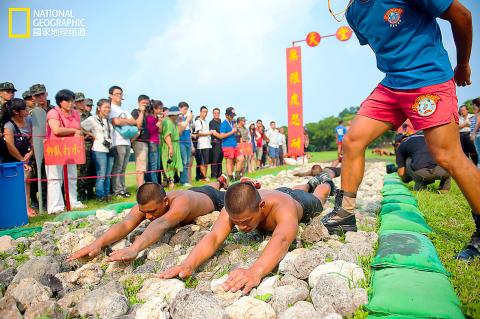The Marine Corps’ grueling “Paradise Road” test to win Amphibious Reconnaissance and Patrol Unit certification was listed as a reasonable training maneuver and not mistreatment under an amendment to Criminal Code of the Armed Forces (陸海空軍刑法) passed by the legislature yesterday.
To pass the test, trainees must crawl along a 50m-long rock and coral-filled path and complete a variety of exercises along the way.
It is considered “necessary training” to for service personnel who hope to become frogmen.

Photo courtesy of the National Geographic Channel
The “Paradise Road” test is the final stage of a 10-week intensive training session that recruits for the marine’s Amphibious Reconnaissance and Patrol Unit have to undergo that challenges their fitness and resilience to the limit.
In the wake of the death of 24-year-old army corporal Hung Chung-chiu (洪仲丘), who died on July 4 last year after being forced to exercise as punishment for taking a smartphone onto his base, there has been widespread public discussion about reforming the military’s management system, as well as other cases of abuse to men serving their mandatory conscription service.
The Executive Yuan proposed the amendment that passed yesterday to establish a definition of “abuse” in the hopes of prevent a recurrence of the Hung tragedy, because the code did not give any guidance on what kind of behavior by commanders would constitute an abuse of subordinates.
The amendment stipulates that inhuman treatment of service personnel in excess of what is necessary for education, training, service or combat and insults the nation’s military forces shall be considered “abuse.”
Under the amendment, the Ministry of National Defense must draw up bylaws to define what is necessary for education, training, service and combat.
Meanwhile, lawmakers passed an amendment to the Medical Care Act (醫療法) to expand the government’s assistance to patients from low-income to low-and-middle income families who need of emergency medical treatment.
The amendment requires hospitals and clinics to provide emergency medical care to patients regardless of their ability to pay for such treatment.
It also requires municipal and county social administrative authorities to provide subsidies to such patients to help them pay for such treatment.
Previously the act’s requirement mandating hospitals and clinics provide emergency treatment only applied to people from low-income families.
Lawmakers also passed an amendment to the Labor Pension Act (勞工退休金條例) that requires employers to make monthly deposits into retirement funds for foreign employees who are married to Taiwanese and who hold residency and work permits.
The deposit shall be equal to 6 percent of the employee’s wages.

Three batches of banana sauce imported from the Philippines were intercepted at the border after they were found to contain the banned industrial dye Orange G, the Food and Drug Administration (FDA) said yesterday. From today through Sept. 2 next year, all seasoning sauces from the Philippines are to be subject to the FDA’s strictest border inspection, meaning 100 percent testing for illegal dyes before entry is allowed, it said in a statement. Orange G is an industrial coloring agent that is not permitted for food use in Taiwan or internationally, said Cheng Wei-chih (鄭維智), head of the FDA’s Northern Center for

LOOKING NORTH: The base would enhance the military’s awareness of activities in the Bashi Channel, which China Coast Guard ships have been frequenting, an expert said The Philippine Navy on Thursday last week inaugurated a forward operating base in the country’s northern most province of Batanes, which at 185km from Taiwan would be strategically important in a military conflict in the Taiwan Strait. The Philippine Daily Inquirer quoted Northern Luzon Command Commander Lieutenant General Fernyl Buca as saying that the base in Mahatao would bolster the country’s northern defenses and response capabilities. The base is also a response to the “irregular presence this month of armed” of China Coast Guard vessels frequenting the Bashi Channel in the Luzon Strait just south of Taiwan, the paper reported, citing a

UNDER PRESSURE: The report cited numerous events that have happened this year to show increased coercion from China, such as military drills and legal threats The Chinese Communist Party (CCP) aims to reinforce its “one China” principle and the idea that Taiwan belongs to the People’s Republic of China by hosting celebratory events this year for the 80th anniversary of the end of World War II, the “retrocession” of Taiwan and the establishment of the UN, the Mainland Affairs Council (MAC) said in its latest report to the Legislative Yuan. Taking advantage of the significant anniversaries, Chinese officials are attempting to assert China’s sovereignty over Taiwan through interviews with international news media and cross-strait exchange events, the report said. Beijing intends to reinforce its “one China” principle

A total lunar eclipse, an astronomical event often referred to as a “blood moon,” would be visible to sky watchers in Taiwan starting just before midnight on Sunday night, the Taipei Astronomical Museum said. The phenomenon is also called “blood moon” due to the reddish-orange hue it takes on as the Earth passes directly between the sun and the moon, completely blocking direct sunlight from reaching the lunar surface. The only light is refracted by the Earth’s atmosphere, and its red wavelengths are bent toward the moon, illuminating it in a dramatic crimson light. Describing the event as the most important astronomical phenomenon